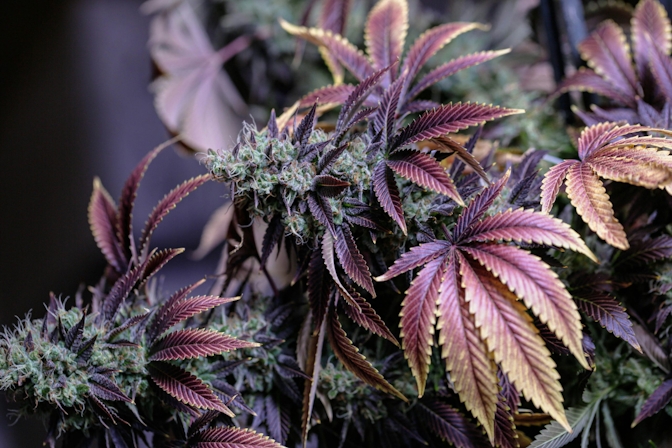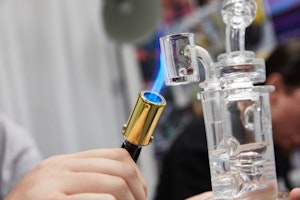
priscilla-du-preez / Unsplash
What Is THC? Here’s Everything You Need To Know
Wondering why cannabis causes a psychoactive "high?" Here's the story of the little molecule that can change the way you think.
What is THC, anyway? You might have heard that THC is the primary psychoactive found in cannabis. But, what does it do? And how does it work? Whether you’re a long-time consumer or just interested, we’ll tell you everything you need to know about this fascinating natural chemical.
What is THC?
Delta9-tetrahydrocannabinol (THC) is the primary intoxicant in the cannabis plant. It’s the molecule that causes the psychoactive “high.” The cannabis compound is most often inhaled by smoking or vaporizing cannabis. But, THC can also be ingested in foods and drinks, as well as applied topically on the skin.
The natural chemical belongs to a group of chemical compounds called cannabinoids, of which the cannabis plant can produce over 113. The potent chemicals are key to the plant’s survival. They help the plant fend off parasites, viruses, bacteria, and other natural predators. They may also protect the plant from radiation from the sun.
In humans, only THC, however, produces such profound and noticeable changes in cognition.
For this reason, cannabis plants that produce THC are more tightly regulated than plants that do not. Cannabis plants that produce more than 0.3 percent of the psychoactive are considered marijuana, while plants that produce less than 0.3 percent THC are classified as hemp. Thanks to this legal definition, only marijuana plants produce substantial amounts of THC.
How Does THC Work?

Jeff W / Unsplash
Out of the 113+ individual cannabinoids found in marijuana, only one of them produces powerful, intoxicating, psychoactive effects: our good pal THC. But why?
It’s simple: shape.
THC just happens to have the right molecular structure to fit into special landing sites on cells throughout the body, called cannabinoid receptors.
THC works by taking over cannabinoid receptor landing sites that sit on the surface of cells, especially nerve cells in the brain. From there, THC alters the chemical activity of the cell and produces a cascade of physiological changes, including the famous psychoactive “high.”
These specific receptors are part of a larger system, called the endocannabinoid system.
The Endocannabinoid System and THC
THC was first isolated in 1964, but it wasn’t until 1988 that Dr. Allyn Howlett of Wake Forest University uncovered the binding sites for THC in the human brain. What she discovered was nothing short of revolutionary: THC was attaching itself to special cell sites in the hippocampus (responsible for memory), the frontal cortex (where we think), and the cerebellum (responsible for movement).
These cell sites are called cannabinoid receptors, and each acts as a part of the endocannabinoid system (ECS). The ECS is a cell receptor network that regulates a variety of bodily functions. It helps maintain homeostasis, which is the scientific word for optimal balance or harmony.
This receptor network sends and receives signals that facilitate larger, more complicated chemical reactions. Certain cannabinoid receptors are most highly concentrated in the central nervous system, lending to the psychoactive effects of THC. Cannabinoid receptors, however, can actually be found all through the body. There are plenty in our digestive tract, our skin, and even in our reproductive organs.
As smoothly as keys fit into a lock, THC binds to cannabinoid receptors and ignites a series of chemical reactions. This causes changes in your brain and body.
When THC engages the brain, you’ll experience altered behavioral and cognitive ability. These changes aren’t necessarily negative changes unless you find them uncomfortable. Mostly, THC will just make you feel different than you normally do.
Once you get used to how it feels to consume THC, you’ll find that you can perform all of your normal daily activities just fine.
In a way, THC is similar to trying on a new pair of glasses. It causes you to see and experience things in a different way.
Cognitive and behavioral changes are not the only effects of THC, however. The cannabinoid engages the immune system, quelling inflammation. It spurs appetite, triggering the release of hunger hormones and jump-starting your metabolism. It can also have a sedative effect, making you feel blissful and sleepy.
THC vs. CBD

Matteo Paganelli / Unsplash
As previously explained, THC is the primary psychoactive compound in marijuana. So what’s with all the talk about cannabidiol (CBD)? CBD is the second most discussed cannabinoid in marijuana, but unlike THC, it is non-psychoactive. Surprisingly, it can also reduce the psychoactive effects of THC.
THC engages directly with cannabinoid receptors in the body. CBD doesn’t bind to the same receptors all that well. Rather, CBD works its magic by inhibiting the enzyme fatty acid amide hydroxyls (FAAH), which is the enzyme that destroys anandamide in the body. This increases the amount of natural endocannabinoids present in your system.
The enzyme FAAH can no longer destroy them, so your own endocannabinoids become more abundant. There are a few other ways CBD interacts with the body, but scientists are still working out the nitty-gritty on what actually happens.
THC vs. THCa

Diyahna Lewis / Unsplash
Many consumers find it surprising that THC is only present in very small quantities on growing cannabis plants. On raw plants, THC is found as the non-intoxicating acid, tetrahydrocannabinolic acid (THCA). The psychoactive form of THC only forms when cannabis is aged and heated.
High temperatures and exposure to the elements break off the tail-end of the THCA molecule and transform it into intoxicating THC. This is why marijuana is smoked, vaporized, or baked into tasty treats. Without heat, cannabis products would not have a psychoactive effect.
THCA is most abundant in the trichome resin glands that sit atop the plant material on cannabis leaves and flowers. This resin is home to hundreds of different molecules, in fact, including other cannabinoid acids, flavonoids, and aroma molecules. Ultimately, this aromatic resin is what makes it easy to distinguish different strains from one another.
The Side Effects of THC
The most famous side effect of THC is an obvious one: the high. The cannabis high, however, doesn’t last forever. This is a good thing—for some people, the effects of THC are pleasant, enjoyable, and relaxing. For others, the compound can cause uncomfortable feelings of anxiety, paranoia, and sleepiness. Here’s what you need to know about the short and long-term effects of THC:
Short-Term Side Effects of THC
There’s no doubt about it—consuming THC might make you feel a bit different from your normal self. There a handful of short-term side effects that might accompany THC. It’s important to note that not everyone has these side effects and you may not experience all of them at once.
You may experience the following for up to 6 hours after inhaling:
- Relaxation
- Euphoria
- A sense of uplift and energy
- Laughter
- Pain relief
- Hunger
- Heavy-bodied sensation
- Drowsiness
- Dizziness
- Red, dry eyes
- Dry mouth
- Increased heart rate
- Skewed sense of time
- Poor spatial memory
- Decreased body temperature
- Anxiety, paranoia
- Tremor, shakiness
The immediate effects of THC will vary slightly depending on the individual cannabis product due to factors like the total percentage of THC, and the percentage of other dominant cannabinoids present in that particular item.
How you consume your cannabis also has an impact on its overall effect. If ingesting cannabis via an edible, it may take anywhere between 30 minutes to two hours to fully feel the effects of THC. When the psychoactive effects begin to kick in, they will be much more potent than they are when inhaling the herb.
Your own body chemistry (such as your body’s ability to produce and process anandamide) will also significantly impact how you process and experience THC. For some, THC may help temporarily ease anxiety and help create a sense of relaxation. For others, THC might have the opposite effect.
Long-term Side Effects of THC
Scientists are still researching the long-term effects of THC. It’s been a painstaking process thus far, as very little research has reached firm, reliable conclusions. Below is a brief summary of the top contenders:
THC May Affect Memory
One study has shown that heavy cannabis users have decreased verbal memory over time. Herb-lovers lost an average of 1 word for every 5 years they consumed THC.
Chronic Bronchitis
Chronic bronchitis is a common side effect of heavy cannabis smoking. But, this side effect is not from THC itself. Instead, it’s a byproduct of smoking. If you smoke a lot for a long period of time, you may experience some lung irritation. These symptoms go away if you stop smoking or switch to a different consumption method. Vaporizers and edibles are great options for those concerned about lung health. Make sure you only get quality vape products from stores like HazeSmokeShop.ca
Tolerance
When you consume a lot of THC regularly for long periods of time, your body develops a tolerance to the compound. This makes the herb less effective, and you’ll have to consume more and more of it to see results. When this happens, take a tolerance break.
Psychosis
If you have a family history of psychosis, you might want to reconsider THC. Research suggests that those with a genetic vulnerability for schizophrenia and psychosis can develop earlier symptom onset when they regularly consume THC.
Herb Recommended Products:
READ MORE










